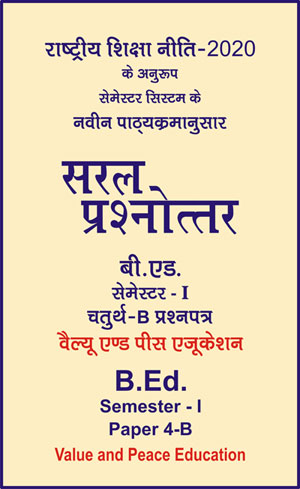|
बी एड - एम एड >> बी.एड. सेमेस्टर-1 प्रश्नपत्र-IV-B - वैल्यू एण्ड पीस एजुकेशन बी.एड. सेमेस्टर-1 प्रश्नपत्र-IV-B - वैल्यू एण्ड पीस एजुकेशनसरल प्रश्नोत्तर समूह
|
5 पाठक हैं |
||||||
बी.एड. सेमेस्टर-1 प्रश्नपत्र-IV-B - वैल्यू एण्ड पीस एजुकेशन (अंग्रेजी भाषा में)
Question- What is the need and importance of Value Education?
Answer-
Value education has a special role in our country with different diversities in religion, ethnicities, cultures, and language backgrounds. Such education is to foster in the long run a culture of 'unity in diversity', a culture of tolerance for pluralism and a culture that promotes peaceful means for resolving problems and issues.
Gandhiji considers value as an inseparable component in the full flowering and development of personality. These values are also considered as determinants of human behavior. They play a vital role in the lives of every individual. Values are enduring and they facilitate standards that guide the conduct of human beings.
In this present modern era, there has been a substantial erosion of values, the fabric of society is being from and age-old ties are breaking up and hence value education aims to provide direction for personal, emotional, social, cultural, ethical, moral, humanistic, and spiritual development. There has been a rise in the number of cases of children with emotional disturbance, anti-social behavior, and drug abuse. The magnitude of value crisis indicates the need for value education in schools and demands conscious, planned, persistent, and purposive efforts by teachers. Value education needs to be an integral component of curricular and co-curricular activities.
Education becomes meaningless unless accompanied by knowledge of values. Educated and intelligent people with poor values in life not only make their own life miserable but also bring more harm to the society than good. The goals of education are not just to produce individuals with knowledge and memory but also to produce individuals with values. Superstitions, ignorance, intolerance, and narrow perceptions lead to fights, riots, and war, making life miserable for everyone. The consumerist and commercial ethos of our times have made the primary goal of education to be to acquire material success and power. In this competitive world, the basic values like honesty and tolerance are neglected in personal and public life, resulting in the rise of crime, violence, cruelty, greed, and apathy to human sufferings. There is a need to overcome the narrow casteist, communalist, linguistic, and regional divides among the people and to promote unity, social and national outlook. Values of idealism, altruism, selflessness, and service to fellow humans are vanishing from our life. There is also a need to develop sensitivity to the beauty of art, literature, craft, and nature.
A number of modern values such as democracy, equality, liberty, fraternity, global perception, international co-operation, and environmental protection of human rights have developed in recent decades. These values are to be inculcated in children right from childhood. Children inherit their values from their parents, teachers, and those around them. The information on values they get from these sources has to be supplemented or corrected through value education in the school. They should be made aware of the importance of leading value-based lives. Values should be deliberately inculcated, directly or indirectly, so that along with the mainstream curriculum, they also acquire the necessary knowledge and skills that prepare them to be responsible citizens. The National Curriculum Framework (2005) stresses education for peace in schools as a counteracting measure to the unprecedented violence that exists globally, Nationally and locally. It also opines that education for peace, tolerance, justice, intercultural understanding, and civic responsibility. It embodies the joy of living and encompasses respect for human rights, justice, tolerance, cooperation, social responsibility, respect for cultural diversities, in addition to a firm commitment to democracy and resolving conflicts non-violently.













